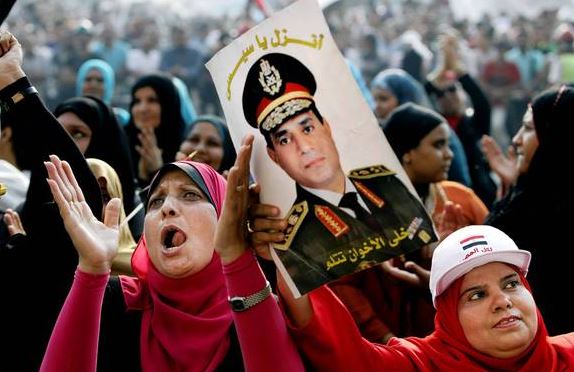Published: 1 August 2013
Country: Egypt


Experts affirm that state media in Egypt characterises for its historical lack of independence and for being the government’s tool.
“There is a difference about how state media works in Egypt. They are the mouthpiece of the government that rules at the time, covering only their point of view”, explains Ahmed Magdy, a media researcher that currently monitors the Egyptian media system through the national media watch group, Egypt’s Media Credibility Index (MCE Watch).
When the Army took over and ousted the President Mohamed Morsi, soldiers were sent to the headquarters of the state broadcast building to monitor the media content and ensure the military’s messages were aired.
The state TV channels broadcast videos with images of soldiers performing their duties to the strains of patriotic music, eager young recruits listening to General Sisi, and Egypt’s “victory” in crossing the Suez Canal in the 1973 war with Israel, reports Reuters. While, state media did not show the images and news of the death of 55 pro-Morsi protesters on 8th July.
“Pro-Morsi were protesting and wanted him to come back. Even today they are still protesting but the state-owned media ignore them as they were not here”, affirms Magdy.
State media shifts according to the discourse of the government in power who takes control of the media through the Information Minister who is in charge of managing the flow of information, controlling the editorial line.
The Information post was suspended after Mubarak stepped down in 2011, but it was reinstated by the military. When Morsi took office, it was expected that he would abolish the post but instead appointed an ally, Salah Abdul Maqsoud, who was forced to leave the state TV on 3rd July.
According to Egyptian law, state-run outlets have to follow the editorial line of the Ministry of Information, and journalists critical of the government have been punished with suspensions or dismissals, report the Committee to Protect Journalists (CPJ).

International organisations such as Human Rights Watch and CPJ have called the interim government to ensure that the political transition process would be inclusive as they promised and stop censoring Islamist media.
“If the interim government is sincere about pursuing reconciliation and democracy, it must begin by respecting freedom of the press. All voices, including those of the Muslim Brotherhood, must be heard,” states Sherif Mansour, CPJ’s Middle East and North Africa program coordinator.
However, the situation has exacerbated to the point that journalists are banned from press conferences if they are not seen to support their side.
Journalists who worked for Al-Jazeera and the Turkish news agency Al-Anadul were barred to attend a press conference held by the political adviser of Adly Mansour, the interim president. Both agencies are seen as pro-Morsi.
After the army took over, Al-Jazeera offices in Cairo were raided, the service was interrupted and several people were detained as they have seen supportive of Morsi.
On the other hand, Muslim Brotherhood barred correspondents from the dailies Al-Youm7 and Al-Watan to attend a press conference in Rabaa Al-Adawiya Mosque. The Brotherhood stated that it would allow only international press to cover its conferences because the local press would use the information to attack it.